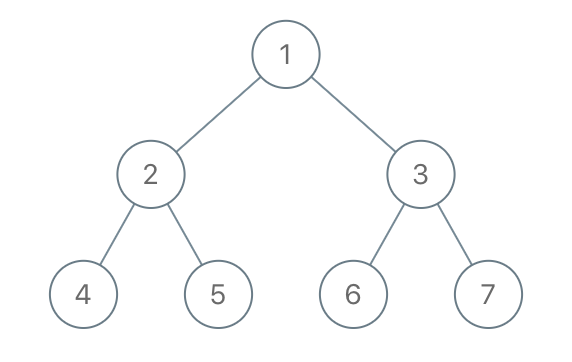LeetCode in Kotlin
1110. Delete Nodes And Return Forest
Medium
Given the root of a binary tree, each node in the tree has a distinct value.
After deleting all nodes with a value in to_delete, we are left with a forest (a disjoint union of trees).
Return the roots of the trees in the remaining forest. You may return the result in any order.
Example 1:

Input: root = [1,2,3,4,5,6,7], to_delete = [3,5]
Output: [[1,2,null,4],[6],[7]]
Example 2:
Input: root = [1,2,4,null,3], to_delete = [3]
Output: [[1,2,4]]
Constraints:
- The number of nodes in the given tree is at most
1000. - Each node has a distinct value between
1and1000. to_delete.length <= 1000to_deletecontains distinct values between1and1000.
Solution
import com_github_leetcode.TreeNode
import java.util.LinkedList
import java.util.Queue
/*
* Example:
* var ti = TreeNode(5)
* var v = ti.`val`
* Definition for a binary tree node.
* class TreeNode(var `val`: Int) {
* var left: TreeNode? = null
* var right: TreeNode? = null
* }
*/
class Solution {
private var toDelete: MutableSet<Int> = mutableSetOf()
private val nodes: Queue<TreeNode?> = LinkedList()
private fun deleteAndSplit(root: TreeNode?): TreeNode? {
if (root == null) {
return null
}
if (toDelete.contains(root.`val`)) {
if (root.left != null) {
nodes.add(root.left)
}
if (root.right != null) {
nodes.add(root.right)
}
return null
}
root.left = deleteAndSplit(root.left)
root.right = deleteAndSplit(root.right)
return root
}
fun delNodes(root: TreeNode?, localToDelete: IntArray): List<TreeNode> {
toDelete = HashSet()
for (node in localToDelete) {
toDelete.add(node)
}
nodes.add(root)
val forests: MutableList<TreeNode> = ArrayList()
while (nodes.isNotEmpty()) {
var node = nodes.poll()
node = deleteAndSplit(node)
if (node != null) {
forests.add(node)
}
}
return forests
}
}

